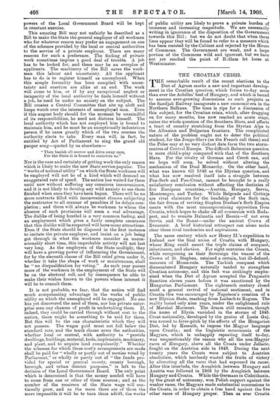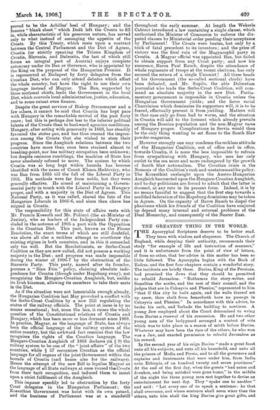THE CROATIAN CRISIS.
THE remarkable result of the recent elections to the Diet of Agram marks a new and important develop- ment in the Croatian question, which forms to-day more than ever the Achilles' heel of Hungary, and which is bound to assume ever-growing dimensions as such projects as the Sandjak Railway inaugurate a, new economic era in the Northern Balkans. The time is ripe for a discussion of this subject, for the Croatian crisis, which, after dragging on for many months, has now reached an acute stage, raises the whole question of the Southern Slays, and affects a tract of country stretching from the Styrian Alps to the Albanian and Bulgarian frontiers. The complicated nature of the problem ought not to deter the political student, for the Jougo-Slays (as the French call them) and the Poles may at no very distant date form the two storm- centres of Central Europe. The difficult Bohemian question is mere child's-play compared with that of the Southern Slays. For the rivalry of German and Czech can, and we hope will soon, be solved without altering the mechanism of the Dual Monarchy. On the other hand, what was known till 1848 as the Illyrian question, and what has now resolved itself into a struggle between Pan-Serb and Pan-Croat, cannot be brought to a really satisfactory conclusion without affecting the destinies of five European countries,—Austria, Hungary, Servia, Montenegro, and Turkey. While Belgrade and Cettinje are rival claimants for the headship of the Serb race, the fair dream of reviving Stephen Dushau's Serb Empire meets with the most uncompromising opposition from Croatia, which hopes to shake off all connexion with Buda- pest, and to reunite Dalmatia and Bosnia—if not even Servia and the Banat—under the ancient Crown of Zvonomir. A brief historical retrospect can alone make clear these rival tendencies and aspirations.
The same century which saw Henry II.'s expedition to Ireland saw the final union of Croatia with Hungary, whose King could assert the triple claims of conquest, inheritance, and election. For eight centuries the Croats, while recognising as their Sovereign the wearer of the Crown of St. Stephen, retained a certain, but ill-defined, measure of Home-rule. The Turkish conquest which dismembered Hungary naturally tended to strengthen Croatian autonomy, and this fact was strikingly empha- sised when the Diet of Agram accepted the Pragmatic Sanction eleven years before it was sanctioned by the Hungarian Parliament. The eighteenth century closed amid a general revival of national sentiment, and in Croatia this was encouraged by Napoleon's creation of a new Illyrian State, reaching from Laibach to Ragusa. The reality lasted only nine years, under the enlightened rule of Marshal Marmont. The dream still remains, though the name of Elyria vanished in the storms of 1848. Croat nationality, developed by the genius of Louis Gaj, was roused to fever-pitch by the efforts of the Hungarian Diet, led by Kossuth, to impose the Magyar language upon Croatia ; and the linguistic monomania of the Magyars, which is unhappily repeating itself to-day, was unquestionably the reason why all the non-Magyar races of Hungary, above all the Croats under Jellacic, fought on the Austrian side in 1848. During the next twenty years the Croats were subject to Austrian absolutism, which tactlessly wasted the fruits of victory by alienating all the races that had espoused its cause. After this interlude, the Ausgleich _between Hungary and Austria was followed in 1868 by the Ausgleich between Hungary and Croatia. While the Germans in Cisleithania, by the grant of autonomy, won Polish support against the weaker races, the Magyars made substantial concessions to the Croats, in order to obtain a free hand against the -five other races of Hungary proper. Then as ever Croatia proved to be the Achilles' heel of Hungary; and the famous " blank sheet " which Peak left the Croats to fill in, while characteristic of his generous nature, has served only to whet instead of assuaging the appetite of the Croats. By this Treaty, which rests upon a contract between the Central Parliament and the Diet of Agram, Croatia (or strictly speaking the Triune Kingdom of Croatia, Slavonia, and Dalmatia, the last of which still forms an integral part of Austria) enjoys complete autonomy under its Ban or Governor, who is appointed by the King on the proposal of the Hungarian Premier. It is represented at Budapest by forty delegates from the Croatian Diet, who can only attend debates which affect the whole country, but have the right to use their own language instead of Magyar. The Ban, supported by three sectional chiefs, leads the Government in the local Diet, which controls local administration, justice, education, and to some extent even finance.
Despite the great services of Bishop Strossmayer and a few others, it cannot be said that Croatia has kept pace with Hungary in the remarkable revival of the past forty years ; but this is perhaps due less to the inferior political talents of the Croats than to backward agrarian conditions. Hungary, after acting with generosity in 1868, has steadily favoured the status quo, and has thus created the impres- sion among the Croats that she wished to stem their progress. Since the Ausgleich relations between the two countries have more than once been strained almost to breaking-point, nor has military occupation been unknown; but despite ominous rumblings, the machine of State has never absolutely refused to move. The system by which Croatia was so long kept within bounds has become of with the name f Count Khuen-Hederviiry, who was Ban from 1885 till the fall of the Liberal Party in 1905. His methods were far from noble, but they were generally effective. He aimed at maintaining a Govern- mental party in touch with the Liberal Party in Hungary proper, and with a majority in the Diet of Agram. This National Party, as it was called, shared the fate of the Hungarian Liberals in 1905-6, and since then chaos has reigned in Croatia.
The responsibility for this state of affairs rests with Mr. Francis Kossuth and Mr. Polonyi (the ex-Minister of Justice), who as leaders of the Independent Party con- cluded in the autumn of 1905 a pact with the Opposition in the Croatian Diet. This pact, known as the Fiume Resolution, the exact terms of which are still doubtful, was above all else a reckless attempt to overthrow the existing regime in both countries, and in this it succeeded only too well. But the Resolutionists, or Serbo-Croat Coalition as they are now called, did not possess a working majority iu the Diet ; and progress was made impossible during the winter of 1906-7 by the obstruction of the Starcevic Party. This party, named after its founder, pursues a " Sinn Fein " policy, claiming absolute inde- pendence for Croatia (though under Hapsburg sway), not recognising the Hungaro-Croatian Ausgleich, but, unlike its Irish kinsman, allowing its members to take their seats in the Diet.
As if the situation were not lamentable enough already, the Hungarian Coalition last May provoked a. conflict with the Serbo-Croat Coalition by a new Bill regulating the status of the railway officials. The point at issue is by no means sensational; but, none the less, it raises the whole question of the Constitutional relations of Croatia and Hungary, which has been more or less dormant since 1868. In practice, Magyar, as the language of State, has always been the official language of the railway system of the entire country, but the awkward fact remains that the law recognises the rights of the Croatian language. The Hungaro-Croatian Ausgleich of 1868 declares (in § 9) the railway system to be one of the " joint affairs " of the two countries, while § 57 recognises Croatian as the official language for all organs of the joint Government within the bounds of Croatia (and hence also for the railways). Hence the attempt of the new Bill to legalise Magyar as the language of all State railways at once roused the Croats from their tacit recognition, and induced them to insist upon a strict fulfilment of the Ausgleich.
This impasse speedily led to obstruction by the forty Croat delegates in the Hungarian Parliament ; the Kossuthist Government was hoist with its own petard, and the business of Parliament was at a standstill throughout the early summer. At length the Wekerle Cabinet introduced a law containing a single clause, which authorised the Minister of Commerce to enforce the dis- puted clauses by Ministerial order pending their acceptance by Parliament! The Croats were beaten, but only by a trick of fatal precedent to its inventors ; and the price of victory was the final ruin of the Magyarophil party in Croatia. A Magyar official was appointed Ban, but failed to obtain support from any Croat party ; and now his successor, Baron Paul Rauch, despite the attendance of whole regiments of troops at the recent elections, has only secured the return of a single Unionist ! All three heads of his Government (the so-called sectional chiefs) have been defeated, and Mr. Supilo, the able Dalmatian journalist who leads the Serbo-Croat Coalition, will com- mand an absolute majority in the new Diet. Parlia- mentary government is impossible in Croatia unless the Hungarian Government yields; and the fierce racial Chauvinism which dominates its supporters will, it is to be feared, effectually prevent it from yielding. Matters will in that case only go from bad to worse, and the situation in Croatia will add to the ferment which already prevails among the Bosnian population and the non-Magyar races of Hungary proper. Complications in Servia would then be the only thing wanting to set flame to the South Slav powder-magazine.
However strongly one may condemn the reckless attitude of the Hungarian Coalition, out of office and in office, towards Croatia, it is none the less impossible to refrain from sympathisiug with Hungary, who sees her only outlet to the sea more and more endangered by the growth of South Slav nationalism. The Croatian crisis is the Nemesis of the Coalition's rash and unstatesmanlike The Kossuthist onslaught upon the Austro-Hungarian Ausgleich has reacted upon the Hungaro-Croatian Ausgleich, and to-day politicians are forced to admit that the latter is doomed, at any rate in its present form. Indeed, it is by no means fanciful to suggest that the first step towards a. modified federation of the Hapsburg dominions may be taken in Agram. On the capacity of Baron Rauch to dispel the phantoms which his friends of the Coalition have conjured up depend many internal and external problems of the Dual Monarchy, and consequently of the Nearer East.











































 Previous page
Previous page